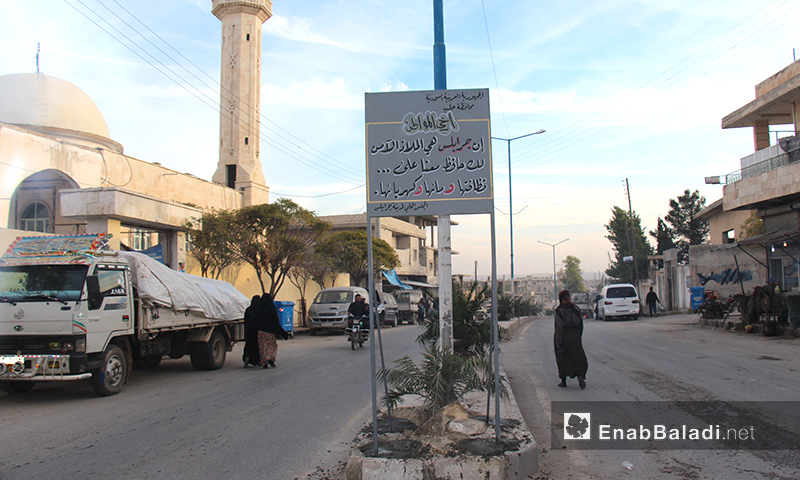All civic activities were absent in Aleppo’s eastern and north-eastern countryside during the two years that “Islamic State” controlled most of the cities and villages of this region bordering Turkey. With the expulsion of “Islamic State”, civic activities have recently returned to the liberated city of Jarablus supported by the “Committee to Restore Stability”.
The committee was formed by a decision from the provincial council of “free Aleppo” at the start of December 2015. Manah Deeb, a member of the committee who is responsible for research and media, spoke about the committee’s work and its recent projects.
Evaluating Needs and Projects to Restore Normal Life
The committee is formed of several subcommittees including engineering, education, legal affairs, medical affairs and research and media. Its main priority in the liberated areas is to offer assistance to local councils to launch their work and make them more effective. Where no local council exists, the committee helps to establish one in a manner that is representative of all the area’s social and religious groups.
Deeb explained that the committee conducts evaluations and studies on the urgent and emergency needs of the cities, villages and residential centers that are being freed from Daesh in Aleppo’s northern and eastern countryside. He pointed out that the committee is currently active in Aleppo’s northern countryside and in the city of Jarablus and its outskirts, and he hopes they will extend their work to the cities of al-Bab and Manbij and their rural outskirts.
The Committee to Restore Stability works in close cooperation with the Turkish government, represented by the Ministry of Foreign Affairs, and other donors, according to Deeb. The committee supported a recently completed campaign launched by pro-revolution activists in the city of Jarablus, which aimed to remove all traces of “Islamic State” from the city. The activists wanted to repaint all of the places covered by “Islamic State” slogans, repaint all walls, store fronts and signs that were in black and raise the independence flag in squares and above public buildings. The campaign was completed on 10th November.
Research and Evaluation Stages
The committee’s work is divided into two stages – the first includes a number of studies and evaluations on the residential areas under Daesh control, examining the population and the state of infrastructure such as bakeries, water, electricity and sanitation. The committee has prepared studies on 565 cities, towns and villages in the region.
Deeb explained that the second stage comes after “Islamic State” forces are kicked out of the area and involves conducting detailed studies of the infrastructure and presenting emergency projects to provide basic daily necessities such as water and bread. He indicated that the committee is especially concerned with relaunching educational facilities and providing health and environmental services.
The committee member highlighted that its work does not involve rebuilding projects but focuses on providing emergency solutions, “Where there is damage to a school, we prepare a project to repair and restore it, but if it is destroyed then we prepare a project to provide a mobile school in the form of a caravan.” Deeb showed Enab Baladi two studies the committee had prepared on the city of Jarablus and the town of al-Raqi and their surrounding areas, including a summary of the state of the infrastructure and population’s needs.
At the start of 2016, the committee provided an ambulance, water tank, electricity generator and mobile school to the area of Hiwar Kilis. The school was later destroyed during an “Islamic State” ambush on the village. The committee also established a summer school in the city of Azaz to provide newly displaced children with classes to get them used to studying again after their schooling was halted under Daesh, according to Deeb.
Deeb also described a new aspect of the committee’s work, “We managed to provide a tractor with a special sanitation vehicle to the village of Kaljibrin and we gave the Health Directorate of the local council a mobile caravan equipped as a medical center in the village of Bab Laymoun a few days ago. We also prepared projects to provide emergency services for 81 residential centers in the northern and eastern countryside.”
The committee’s work is not limited to the areas liberated from “Islamic State” rule. Deeb pointed out that the committee managed to provide 265 mobile toilets to makeshift camps and provide support to the humanitarian work teams who are helping to move displaced persons from the village of al-Khalftali to the city of Azaz for free.
The committee also formed a team to communicate with Democratic Syrian Forces to help resolve some problems and, a few months ago, succeeded in returning the bodies of Free Syrian Army fighters killed in the Tel Rifaat battle so they could be buried in Azaz. The committee also succeeded in securing the passage of medical and humanitarian convoys between the western and northern countryside of Aleppo via Afrin, but as Deeb explained, “this team’s work was later suspended.”
The Committee to Restore Stability’s work continues as battles in Aleppo’s north-eastern countryside rage against “Islamic State” forces as part of the Euphrates Shield operation involving a number of Free Syrian Army factions with land and aerial support from Turkey. Its biggest victory to date is the liberation of the city of Jarablus on 24 August 2016.
